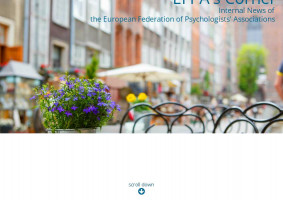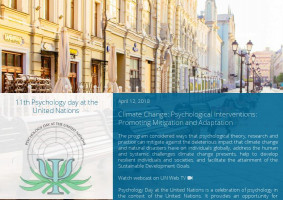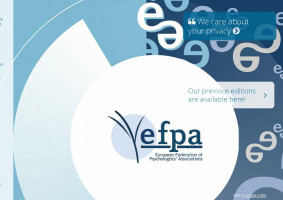Assisting People with Disabilities in Case of Disaster
European Network for Psychosocial Crisis Management (UNAD)
The German Federal Office of Civil Protection and Disaster Assistance (BBK), which is part of the Federal Ministry of the Interior (BMI), has organised numerous research projects focusing on the sociological issues of civil protection since 2000; either at German universities or carried out by the BBK itself.
The BBK has worked together with partners from various specialist authorities, fire services, police forces, aid organ-isations, the Federal Agency for Technical Relief, churches, associations, societies, insurance companies and other organisations to evaluate scientific findings in the field of psychosocial crisis management, and has used these findings to develop quality standards that are in line with international guidelines and that have now been passed as binding within Germany.
Changing Values and Identities in the Post-Communist World
Editors: Lebedeva, Nadezhda, Dimitrova, Radosveta, Berry, John (Eds.)
This book offers a comparative analysis of value and identity changes in several post-Soviet countries. In light of the tremendous economic, social and political changes in former communist states, the authors compare the values, attitudes and identities of different generations and cultural groups. Based on extensive empirical data, using quantitative and qualitative methods to study complex social identities, this book examines how intergenerational value and identity changes are linked to socio-economic and political development. Topics include the rise of nationalist sentiments, identity formation of ethnic and religious groups and minorities, youth identity formation and intergenerational value conflicts.
The European Psychologist
Volume 23, no.2 is now available online
Highlights:
Heraclitus’ River and Recent Advances in Criminal Psychology
What Doesn’t Work to Reduce Reoffending? A Review of Reviews of Ineffective Interventions for Adults Convicted of Crimes
Child Sexual Exploitation Materials Offenders. A Review
The Stigma of Pedophilia. Clinical and Forensic Implications
Primer on the Contribution of Crime Scene Behavior to the Forensic Assessment of Sexual Offenders
Internet- and Mobile-Based Psychological Interventions: Applications, Efficacy, and Potential for Improving Mental Health A Report of the EFPA E-Health Taskforce
And more publications...
Article
Reciprocal Associations between Electronic Media
Use and Behavioral Difficulties in Preschoolers.
Tanja Poulain, Mandy Vogel , Madlen Neef , Franziska Abicht , Anja Hilbert ,
Jon Genuneit , Antje Körner and Wieland Kiess
The use of electronic media has increased substantially and is already observable in young children. The present study explored associations of preschoolers’ use of electronic media with age, gender, and socio-economic status, investigated time trends, and examined reciprocal longitudinal relations between children’s use of electronic media and their behavioral difficulties.
Adolescent Psychopathology in Times of Change
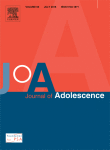
Edited by Wim Beyers, Inge Seiffge-Krenke, Håkan Stattin, Marion Kloep
Special issue in Journal of Adolescence, based on the 2016 conference in Andalusia, Spain
We experience many changes in Western society during the last decade (such as immigration; economic crisis, delay of markers of adulthood and a prolonged dependence on parents), which are reflected in changing patterns of psychopathology.
Although the overall rate of psychopathology during adolescence has not changed, there are significant changes in specific disorders such as traumatic diseases, eating disorders, self- harm, antisocial and delinquent behaviors, which are bound to the cultural, economic and political context adolescents live in.
Further, comorbidity, especially with depression and anxiety, has become the rule and makes it increasingly difficult to design therapeutic approaches which apply for these youth. This calls upon new diagnostic tools that go beyond the diagnosis (e.g., the symptom level) and help in planning and conducting a treatment as well as evaluating its outcome.
Of special concern are treatments for multiple traumatized adolescent refugees coming from non-Western countries. New methods are also necessary to discriminate between normative and pathological development early on. Further, how parental psychopathology could serve as a model, but also as a risk factor for adolescents’ or emerging adults’ psychopathology needs to be explored.
Considering the “linked lives” of parents and adolescents with reciprocal dependence over an extended time, multi-system perspectives are needed which integrate work with adolescents and with parents.
Multi-system perspectives are also necessary for all forms of psychopathology in which early adverse life conditions and multiple traumatization has resulted in severe disorders like attachment disorders or aggressive acting out. Against this background we invited papers that have a psychopathology and developmental psychopathology orientation with a strong focus on clinical and risk groups.
Well-Being of Youth and Emerging Adults across Cultures
Novel Approaches and Findings from Europe, Asia, Africa and America
Editors: Dimitrova, Radosveta (Ed.)
The current volume presents new empirical data on well-being of youth and emerging adults from a global international perspective. Its outstanding features are the focus on vast geographical regions (e.g., Europe, Asia, Africa, North and South America), and on strengths and resources for optimal well-being. The international and multidisciplinary contributions address the complexities of young people’s life in a variety of cultural settings to explore how key developmental processes such as identity, religiosity and optimism, social networks, and social interaction in families and society at large promote optimal and successful adaptation.
The volume draws on core theoretical models of human development to highlight the applicability of these frameworks to culturally diverse youth and emerging adults as well as universalities and cultural specifics in optimal outcomes. With its innovative and cutting-edge approaches to cultural, theoretical and methodological issues, the book offers up-to-date evidence and insights for researchers, practitioners and policy makers in the fields of cross-cultural psychology, developmental science, human development, sociology, and social work.
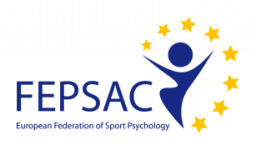
Manage talent development, increase resilience and understand pressures in sport with our latest FreeBook, in partnership with FEPSAC.
Download this essential FreeBook which provides a handy compendium of direct and practical insights to help sport psychologists, coaches, athletes and parents understand, and manage, talent and pressure in sport.
Studies in Adolescent Development
The Studies in Adolescent Development series is published in conjunction with the European Association for Research on Adolescence and is committed to publishing and promoting the highest quality of writing in the field of adolescent development.
The series aims to respond to the recent shifts in the social and ecological environment of adolescents and in the new theoretical perspectives within the social science by providing a range of books, each of which deals in-depth with an aspect of current interest within the field of adolescent development.
Each book focuses on a specific aspect of adolescence and provides either a clear picture of the research endeavours which are currently serving to extend the boundaries of our knowledge and understanding of the field, or an insightful theoretical perspective of adolescent development. The editors encourage publications which represent original contributions to the field.
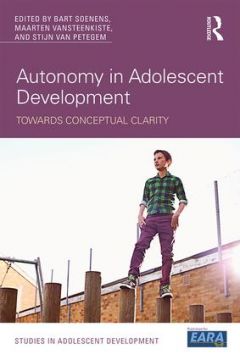
Autonomy in Adolescent Development
Towards Conceptual Clarity
Edited by Bart Soenens, Maarten Vansteenkiste, Stijn Van Petegem
Autonomy is a central feature of adolescent development, playing a key role in adolescents’ psychosocial adjustment. However, opinions differ about the nature and definition of autonomy and so important questions regarding the role of autonomy in adolescents’ development have remained unanswered. This book helps to address these questions while bringing clarity to the literature on adolescent autonomy.
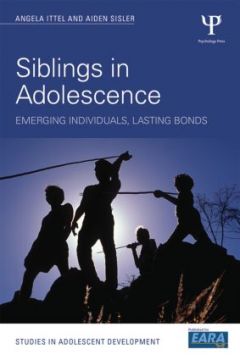
Siblings in Adolescence
Emerging individuals, lasting bonds
By Aiden Sisler, Angela Ittel
How do brothers and sisters shape one another? Siblings in Adolescence provides a comprehensive overview of the most up-to-date, international empirical research on the sibling bond during the critical adolescent years. The authors examine how the relationship impacts on adolescent development, as well as the effect on and within the family, using evidence from behaviour genetics, cross-cultural studies, and research utilizing both quantitative and qualitative methods.
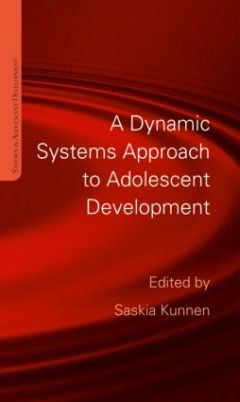
A Dynamic Systems Approach to Adolescent Development
Edited by Saskia Elske Kunnen
The dynamic systems approach is a rapidly expanding advancement in the study of developmental research, particularly in the domain of adolescent development. It provides a unique way of examining the subject, and this innovative study of developmental processes helps social scientists to translate dynamic systems conceptualizations into clear empirical research that readers will be able to implement themselves.
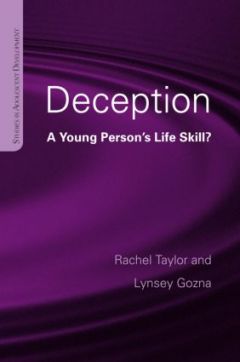
Deception
A Young Person's Life Skill?
By Rachel Taylor, Lynsey Gozna
This book considers the role of deception during adolescence, and explores the factors which underpin adolescents’ choice to deceive, whether these deceptions will be successful, and the ways in which such lies could be detected. While deception is considered to be antisocial or even pathological in some circumstances, the central argument of this book is that lying can be a skilled behaviour which is necessary to allow adolescents to establish autonomy.
_w240_h354_1.jpg)
The Transition to Adulthood and Family Relations
An Intergenerational Approach
By Eugenia Scabini, Elena Marta, Margherita Lanz
Series Editor: Sandy Jackson
This book explores the development of a new path of transition between adolescence and adulthood in recent generations. Whereas traditionally the transition into adulthood was marked by a clear and irreversible change in condition, we are now seeing a continuance in the role and influence of the family on the young adult. What consequences does this have for our society? Is the persistence of emotional bonds which previously loosened during adolescence, inhibiting young people from developing into full adulthood?


